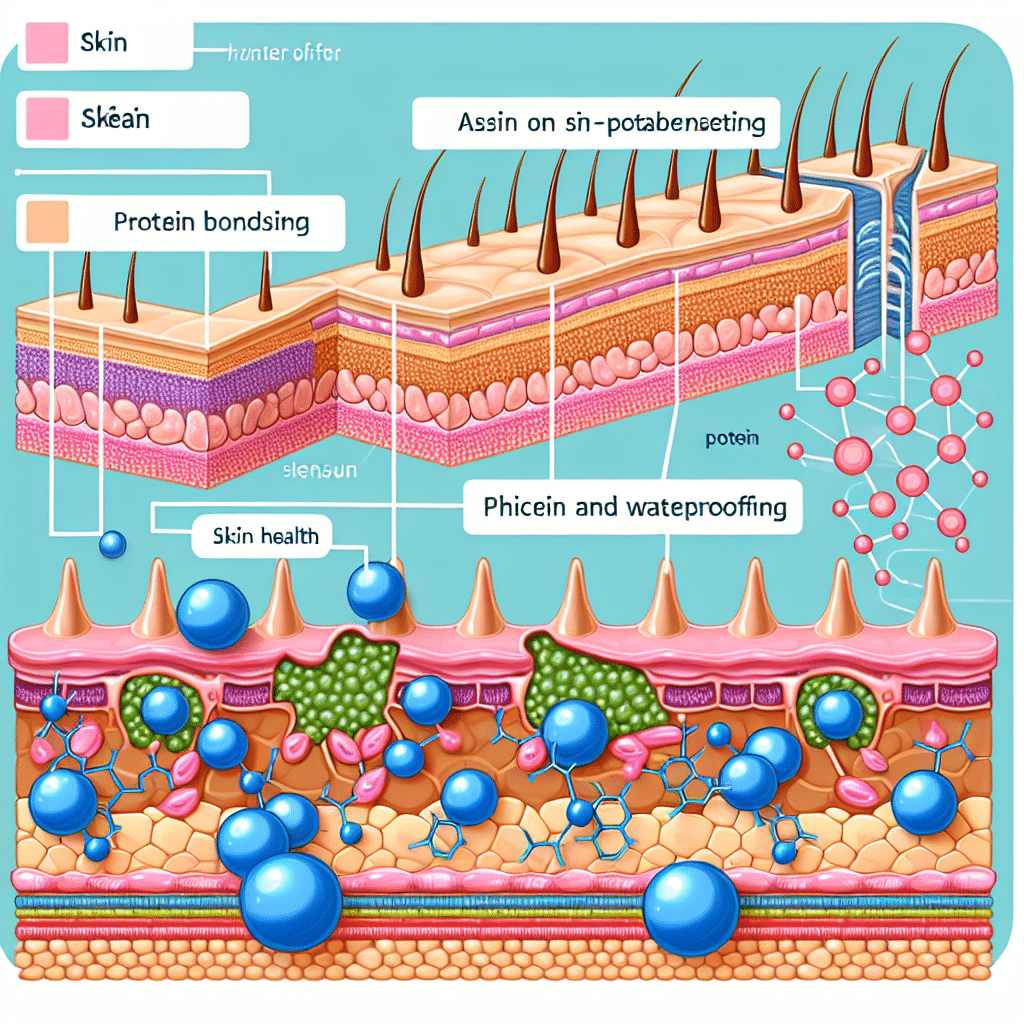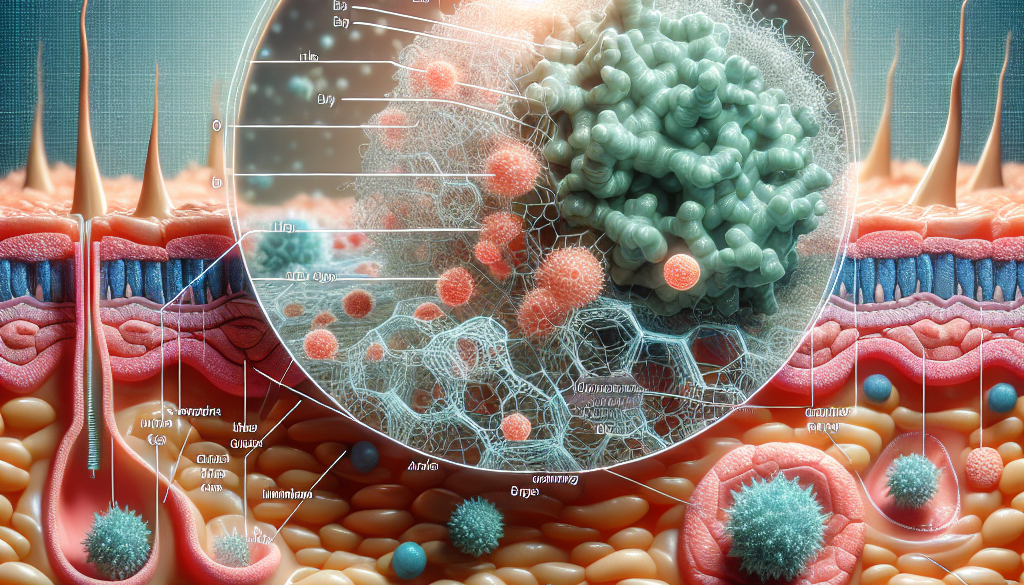Skin Health: The Protein That Thickens and Waterproofs
-
Table of Contents
- Skin Health: Proteins That Enhance Barrier Function and Hydration
- Understanding Keratin: The Skin’s Protective Protein
- The Role of Keratin in Skin Barrier Function
- Hydration and Waterproofing: Keratin’s Hygroscopic Properties
- Factors Affecting Keratin Production and Skin Health
- Enhancing Skin Health with Keratin-Rich Products
- Conclusion: The Importance of Keratin for Robust Skin Health
- Discover ETprotein’s Premium Protein Products
Skin Health: Proteins That Enhance Barrier Function and Hydration

The human skin is an incredibly complex organ, serving as the body’s first line of defense against the external environment. It protects against pathogens, UV radiation, and harmful chemicals, while also managing hydration and temperature. Central to these functions is a protein that plays a pivotal role in thickening and waterproofing the skin: keratin. This article delves into the science behind keratin, its importance for skin health, and how it contributes to the skin’s barrier function and hydration.
Understanding Keratin: The Skin’s Protective Protein
Keratin is a type of fibrous protein that is a key component of the skin, hair, and nails. It is produced by keratinocytes, which are the predominant cell type in the epidermis, the outermost layer of the skin. Keratin provides structural strength and resilience, making it essential for the skin’s protective barrier.
- Structure of Keratin: Keratin proteins are long chains of amino acids that form helical structures. These helices assemble into filaments, which are further organized into complex networks providing mechanical support to the skin.
- Types of Keratin: There are two main types of keratin: soft keratins, which are found in the skin, and hard keratins, which make up hair and nails. Each type is adapted to its specific function, with varying degrees of hardness and flexibility.
- Role in Skin Health: In the skin, keratin helps to form a dense layer of cells that are resistant to friction and minor injuries. It also contributes to the waterproofing of the skin, preventing excessive water loss and maintaining proper hydration levels.
The Role of Keratin in Skin Barrier Function
The skin barrier is essential for maintaining homeostasis and protecting the body from external threats. Keratin plays a crucial role in the formation and maintenance of this barrier.
- Physical Barrier: Keratinocytes migrate to the surface of the skin as they mature, where they eventually die and form a tough, protective layer. The keratin within these cells provides the physical strength needed to withstand environmental stressors.
- Chemical Barrier: The skin’s barrier function also involves a chemical aspect, where keratin helps to bind together lipids that seal the spaces between cells, preventing the penetration of harmful substances.
- Biological Barrier: Keratinocytes are involved in the skin’s immune response, signaling to the body when pathogens are present. Keratin itself can also act as a protective agent against microbes.
Hydration and Waterproofing: Keratin’s Hygroscopic Properties
Hydration is vital for skin health, and keratin contributes significantly to the skin’s ability to retain moisture.
- Water Retention: Keratin has hygroscopic properties, meaning it can attract and hold water molecules. This helps to keep the skin hydrated from within.
- Waterproofing: The outer layer of the skin, enriched with keratin, prevents excessive water loss by creating a barrier to evaporation. This waterproofing effect is crucial for maintaining the skin’s moisture balance.
- Flexibility: Proper hydration ensures that the skin remains flexible and elastic. Keratin’s role in maintaining moisture levels helps to prevent dryness, cracking, and other skin issues.
Factors Affecting Keratin Production and Skin Health
Several factors can influence keratin production and, consequently, skin health. Understanding these factors can help in developing strategies to maintain healthy skin.
- Genetics: Genetic predispositions can affect keratin production and the quality of the skin’s barrier function.
- Age: As we age, keratin production can decrease, leading to thinner skin and a weakened barrier.
- Diet: A diet rich in proteins, vitamins, and minerals is essential for healthy keratin production. Nutrients like vitamin A, vitamin C, and zinc play a significant role in skin health.
- Environmental Factors: Sun exposure, pollution, and harsh chemicals can damage keratinocytes and affect keratin levels in the skin.
- Health Conditions: Certain skin conditions, such as psoriasis and eczema, can disrupt keratin production and compromise the skin’s barrier function.
Enhancing Skin Health with Keratin-Rich Products
There are numerous products on the market designed to support keratin levels in the skin and promote a healthy barrier function.
- Topical Treatments: Creams and serums containing keratin or keratin-boosting ingredients can help to reinforce the skin’s barrier and improve hydration.
- Supplements: Dietary supplements that provide the necessary nutrients for keratin production can support skin health from within.
- Protective Measures: Using sunscreens and avoiding harsh chemicals can protect keratinocytes and preserve keratin levels in the skin.
Conclusion: The Importance of Keratin for Robust Skin Health
Keratin is a fundamental protein that contributes to the skin’s strength, resilience, and hydration. It is essential for the skin’s barrier function, protecting against environmental damage and preventing moisture loss. By understanding the factors that affect keratin production and taking steps to support it through diet, lifestyle, and skincare products, individuals can maintain healthy, well-hydrated skin.
Discover ETprotein’s Premium Protein Products
For those looking to enhance their skin health through nutrition, ETprotein offers a range of high-quality protein products. Their organic and non-GMO plant proteins, such as rice protein, pea protein, and various seed proteins, provide the essential amino acids necessary for keratin production and overall skin health. ETprotein’s products are ideal for inclusion in dietary supplements, health and wellness products, and more, supporting industries that prioritize skin health and nutrition.
About ETprotein:
ETprotein, a reputable plant protein vegan protein Chinese factory manufacturer and supplier, is renowned for producing, stocking, exporting, and delivering the highest quality organic bulk vegan protein and plant proteins. They include Organic rice protein, clear rice protein, pea protein, clear pea protein, watermelon seed protein, pumpkin seed protein, sunflower seed protein, mung bean protein, peanut protein etc. Their offerings, characterized by a neutral taste, non-GMO, allergen-free attributes, cater to a diverse range of industries. They serve nutraceutical, pharmaceutical, cosmeceutical, veterinary, as well as food and beverage finished product distributors, traders, and manufacturers across Europe, USA, Canada, Australia, Thailand, Japan, Korea, Brazil, and Chile, among others.
ETprotein specialization includes exporting and delivering tailor-made protein powder and finished nutritional supplements. Their extensive product range covers sectors like Food and Beverage, Sports Nutrition, Weight Management, Dietary Supplements, Health and Wellness Products, and Infant Formula, ensuring comprehensive solutions to meet all your protein needs.
As a trusted company by leading global food and beverage brands and Fortune 500 companies, ETprotein reinforces China’s reputation in the global arena. For more information or to sample their products, please contact them and email sales(at)ETprotein.com today.














